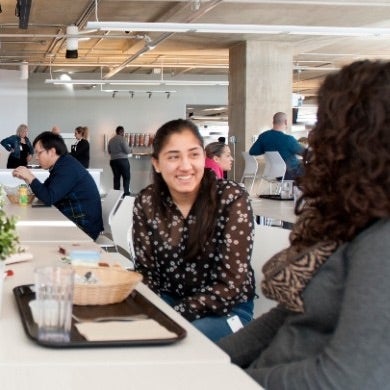Workplace friendships are more than just fun, they’re fantastic for your organization! When employees make friends with their colleagues, they have improved career development and job satisfaction, and the organization benefits from better work performance and stronger organizational commitment. Research has also shown that social interactions during work-integrated learning experiences can lead to the development of workplace friendships, which may facilitate learning outcomes, enhance the meaningfulness of the work experience, and contribute to a sense of belonging.
We’ve analyzed the factors that foster these friendships – even during a brief four-month co-op work term – and have tips you can incorporate into your onboarding processes and workplace culture so workplace friendships can flourish!
Sharing is caring
We know shared interests and values can motivate supervisors and students to build reciprocal partnerships, but there are major benefits to fostering these personal connections among colleagues as well! How can your organization facilitate these social connections?
- Hire more than one co-op student! Some students have noted that building friendships with other co-op students improved their work term experience.
- Onboard students and/or new hires as a group, incorporating some fun team building activities to start building those relationships.
- Allow students to join committees that appeal to their career or personal interests while on their work term! You’ll gain a fresh new perspective, and they’ll feel like they’re making an impact. At work and beyond!
Collaboration nation
Collaboration between students and organizational members seems key to the development of friendships at work. Onboarding and including your co-op students in the same way as permanent staff may help students feel a sense of belonging in the organization. Ensure your students have opportunities to share tasks with other students, collaborate on projects with permanent colleagues, join team meetings, or get involved in committee work. Even though co-op students are only with your organization for a short period of time, they want to be integral team members, and they’re up for the challenges that you can offer!
Can we chat?
We all know the value of those informal hallway conversations we have at work. In many ways, throughout the pandemic, we have been more connected than ever - what’s missing are the more informal social activities that can lead to friendships.

Work at creating a workplace culture that doesn't just permit - but encourages - informal socializing:
- Create break and lunch spaces where staff feel comfortable eating and socializing together and invite your students to join you for lunch.
- Get out of the office for a staff picnic, form an intramural sports team, or schedule optional outings outside of work.
- Find ways for your virtual or hybrid staff to have some fun as a team! Take an hour out of your Friday to play a virtual game of Sketchful or host online trivia events for the whole department.
Work at creating a workplace culture that doesn't just permit - but encourages - informal socializing:
- Create break and lunch spaces where staff feel comfortable eating and socializing together and invite your students to join you for lunch.
- Get out of the office for a staff picnic, form an intramural sports team, or schedule optional outings outside of work.
- Find ways for your virtual or hybrid staff to have some fun as a team! Take an hour out of your Friday to play a virtual game of Sketchful or host online trivia events for the whole department.

To be or not to be (in the office)
Many employees enjoy the flexibility of working from home, but what does working remotely mean for their workplace friendships? The good news is our research found virtually no difference in the prevalence of workplace friendships among co-op students working in person vs hybrid – working in person even part-time seems to be enough to provide those opportunities for informal socialization to happen naturally. Workplace friendships can still form in an entirely virtual workplace when the other factors listed above are in place, but the prevalence is much lower.
We’re continuing to study the work mode preferences of the next generation of talent, and the impacts of in-person, hybrid, and virtual workplaces. Watch for future Insight newsletters to learn more!